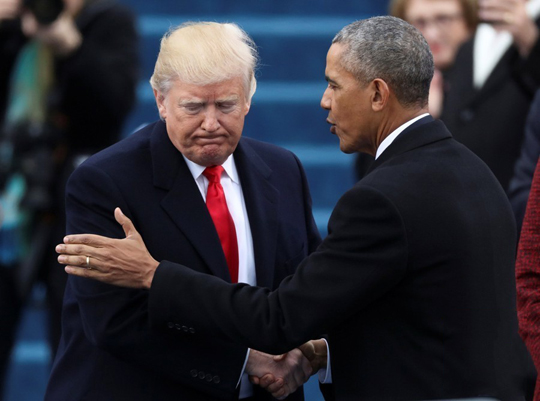Washington, Mar 21: Two top US spymasters on Monday trashed President Donald Trump's allegation that his Trump Tower was wiretapped on the orders of his predecessor Barack Obama, saying there is no evidence to support the claim.

"With respect to the president's tweets about alleged wiretapping directed at him by the prior administration, I have no information that supports those tweets, and we have looked carefully inside the FBI," FBI Director James Comey told the powerful House Permanent Select Committee on Intelligence.
Responding to a question from the members on Trump's allegation, Comey said the Justice Department had also looked for evidence to support Trump's allegation that his Trump Tower in New York - the headquarters of his presidential campaign - was wiretapped but could not find any.
"The Department of Justice has asked me to share with you that the answer is the same for the Department of Justice and all its components, the department has no information that supports those tweets," Comey said, noting that no US president can unilaterally order a wiretap.
Admiral Michael Rogers, Director of the National Security Agency and Commander of US Cyber Command, also spoke on the same lines asserting he has seen no evidence of wiretapping as alleged by Trump through his tweets.
Trump has alleged that Obama had ordered wiretapping of the Trump Tower in the run up to the November 8 presidential election. His accusation had led to a huge uproar in the US and an Obama aide had to come forward to reject the charge.
Trump's allegation had also triggered a diplomatic row with Britain recently, as Trump and aides cited a discredited report by an American television network that Obama asked a British intelligence agency to tap him.
The British government had objected to the claim and the Trump administration had assured London that the White House will not use the allegations again.
Soon after Comey's Congressional hearing, Democrats demanded that Trump apologise to Obama.
"President Trump owes the American people and President Obama more than just an explanation, but an apology. He should admit he was wrong, stop the outlandish Tweets, and get to work on behalf of this country," said Senate majority leader Charles Schumer.
"The FBI director has now confirmed what members from both parties in both the House and the Senate have said: 'President Obama did not order a wiretap on Trump Tower'. No matter what else happened, there are no ifs, ands, or buts about it - President Obama wiretapping Trump Tower did not happen," he said.
"By tweeting this claim and attempting to put unproven theories from the fringes of the American media into the mainstream, President Trump has severely damaged his credibility, which is essential to being president. He needs to retract his claim immediately," Schumer alleged.




Comments
Add new comment